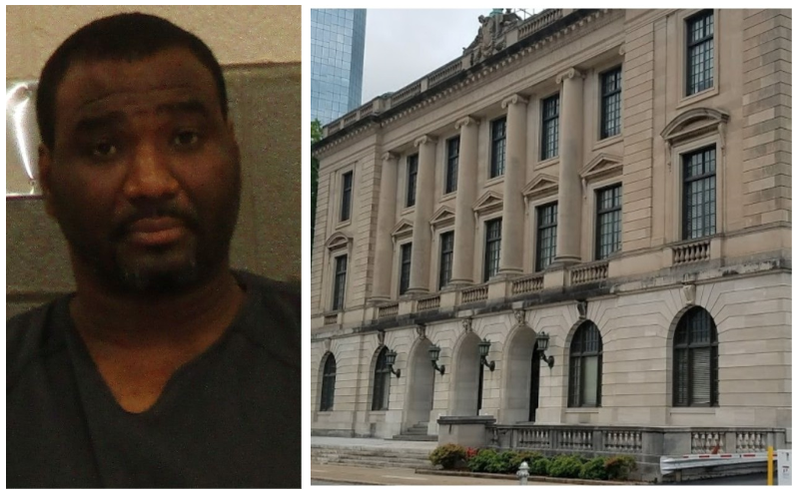A Little Rock man who gunned down a mother of two -- his business partner -- in her front yard then spent eight months as a fugitive was sentenced to life in prison Thursday for first-degree murder.
Deciding on the guilty verdict for Curtis Dorsey took the nine women and three men, which included a Lonoke County sheriff's deputy as jury foreman, about 55 minutes. Jurors deliberated about 35 minutes to decide on the life-sentence punishment recommendation for special Circuit Judge David Laser.
Sharniece Renea Hughes was a hardworking single mother who held down two jobs plus financed the food-truck venture that she ran with Dorsey, senior deputy prosecutor Jeanna Sherrill told jurors Thursday.
Asking for the maximum penalty, she called on jurors to be a "voice for justice" in the community, not just for Hughes, but also for her children, her parents and sisters, and the neighbors who went to her aid after she was shot.
Dorsey, who turns 36 on Monday, did not testify, but his lawyers told the jury that he was the victim of mistaken identity and fled only because he was wrongly accused and afraid of police.
Hughes was killed in front of her Mabelvale Pike home on Labor Day 2016, and Dorsey was immediately suspected because Hughes' teenage daughter, Sadia Rivers-Hughes, had seen him sitting in a black Toyota Tundra pickup talking to Hughes just seconds before the shooting. Several witnesses described seeing the truck driving away from Hughes' home immediately after the shooting.
Hughes, 35, was struck five times, including through the heart and head, and several times in the back. The trajectory of two of the bullet wounds show she was lying on the ground with the killer standing over her, prosecutors said.
Hughes and Dorsey owned an Italian ice food truck, and they had argued that morning over the business for some reason. Hughes was heard on the phone arguing with Dorsey, and just before she died Hughes had asked her mother for help buying Dorsey out of their frozen dessert business, according to trial testimony.
Sherrill, with fellow deputy prosecutor Anna Catherine Cargill, argued that Dorsey's efforts to elude police showed his guilty conscience. He disappeared from his Pinnacle Pointe Hospital job the same day Hughes was killed. Six weeks later, Dorsey, driving the black Tundra, led El Paso, Texas, police on a lunchtime, high-speed chase that ended with Dorsey crashing through border barricades and into Mexico.
Seven months after that chase, in July 2017, U.S. marshals arrested Dorsey in Clarksburg, W.Va., where he was living under an assumed name, Maxwell Akuma, complete with a Massachusetts driver's license. He flung himself off a three-story building, severely breaking his leg, rather than surrender to federal agents.
In closing arguments, Sherrill told jurors that Dorsey's efforts to elude authorities proved his guilt. He knew he'd been seen by neighbor Tony Reyes, the prosecutor said.
"What do you do when you gun someone down -- shoot them five times -- then as you're leaving lock eyes with a neighbor?" Sherrill said. "What do you do? You run."
She further urged jurors to reject "red herring" defense claims that discrepancies in witness descriptions about the pickup Dorsey was driving and what he looked like had any significance.
Defense attorney Bill James told jurors that differing witness accounts showed how they had all tried to change their stories to bolster the police version of events, likely out of sympathy for Hughes' family who adamantly believe Dorsey killed Hughes.
Reyes could not pick Dorsey out of a police lineup as the man he saw driving from the scene, James said, and Shannon Branham, the neighbor who tried to perform cardiopulmonary resuscitation on Hughes, initially described a different type of pickup leaving the scene of the shooting.
Hughes' mother, Blanche Spencer, who testified about seeing the pickup leaving the scene, contradicted all of the other witnesses who said they saw the truck heading in a different direction, said James, who was assisted at the trial by Megan Wilson and Nick Dunn.
James heaped scorn on Lakiera Madden, 24, of Dumas, the only person who actually saw the shooting. Getting her to show up for trial required threatening her with arrest, which jeopardized her job as a prison guard, James told jurors. Fear of alienating prosecutors by contradicting them spurred her to change her story about the person she saw kill Hughes, the attorney said.
"She doesn't want to be the one who proves Curtis Dorsey's innocence," James said.
Madden lived across the street with her aunt and had been there only a week when she happened to look out of her bedroom window, she testified.
She was too far away to see the killer well enough to identify him, but Madden, who is black, described the gunman to police as tall and light-skinned, possibly Hispanic.
Dorsey is black and 6 feet 7 inches tall. Madden told jurors that the killer was black, blaming her original description of his complexion on a trick of the light.
James also described as baseless the prosecution claim that Dorsey killed Hughes because he was angry that she had planned to buy him out and was pushing him out of the business.
There was no evidence of that because everything about the business, Rock-N-Flavors Italian Ice, including the Toyota Tundra pickup, was in Hughes' name, he said. If Hughes had wanted Dorsey out, she could have cut him off without having to pay him anything, James told jurors.
Metro on 09/13/2019
